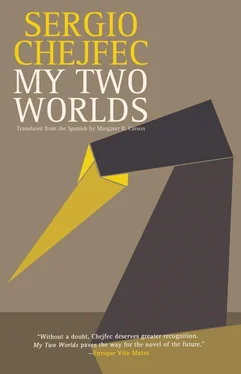So that afternoon, when I was just about to give up on getting to the park, the idea of paying attention to the relative location of places, rather than to their literal position on the map, was an especially inspired one, though I can’t say if it was due to my reviled free-floating Internet sensibility or to a sudden distracted impulse. I looked the map over one last time and folded it — but didn’t put it away, in case I’d be needing it soon — said a mental goodbye to the mechanical uproar that was the street corner, and set out for the park. To get there I proceeded fairly straight on a pavement that was at first hidden, disappearing from time to time under highways or elevated structures. To one side was a medical school, aged buildings of a few, but high-ceilinged stories, clearly paired with the hospital pavilion I mentioned earlier. Further on, the path turned into a broad paved platform where crowds that grew increasingly larger gathered to wait for buses. There were several clusters of passengers, each group evidently waiting for a different bus. In one of the clearings between bus stops I saw the street vendor again, the one with the two-wheeled cart, now asking for help in unloading the merchandise I’d seen him pack up earlier. The man sold women’s clothing along with spare electrical parts and batteries. I supposed the weight was in the spare parts and batteries. That’s how I began to think about street vendors. .
That morning, my first thought had been about the man from the countryside. I’m not sure on which river of sleep I’d beheld him during the night, but I remember that just as I was about to wake up and start the day, in a half-awaking that seems like a half-sleep, both states habitual to me, I thought of the man who was afraid of the dark. I couldn’t tell if it was daylight yet, but I imagined that if it were still night, and if I were that man, I would be afraid. Then it occurred to me that the word might have been misused in the program. “Afraid” often needs qualification because it can be interpreted in various ways. Maybe he was referring to a kind of uneasy anticipation, as when one says “I’m afraid it will rain,” though the word can also refer to something more primal and uncontrollable.
When I opened the curtains I saw the beginning of a splendid spring day. Just below the window and across the street was a building under construction, and above it, since the land rose in that direction, one could see, through a row of leafy, evenly-spaced trees, the dome and the neoclassical spires of what seemed to be the cathedral. I turned on the television to listen as I got dressed. A voice that sounded different to me recited the price of seeds and said grains would be coming up next. I remembered how at the book fair the previous evening, each time I passed the booth for the local historical society I saw titles dealing with agrarian subjects, which of course reminded me of Argentinean culture in its rural, pampean, primary-school dimension, I’m not sure what to call it. I wanted to have a coffee quick and head out to the street, so I finished putting my things in order and went into the bathroom.
Once I was in the downtown of another city and saw a street vendor being robbed. I suppose he had just begun to set up or was about to leave; in any event, he was leaning over some cardboard boxes with his back to the merchandise. A passerby noticed he wasn’t paying attention, moved closer to the table, and carried off a bag of scarves or pashminas, whatever they’re called. That caused me to reflect that street vendors are at their most vulnerable, or simply at their weakest, when they’re setting up their goods or stowing them away. The street was busy, with people on all sides; and yet I was the only one who noticed what had happened. Even the victim himself, when he turned around, kept arranging his things as if nothing was wrong. A moment later he sensed that something strange was going on because his display had changed, things were missing, though he probably wasn’t sure, either. This tempted me to tell him he’d just been robbed, but I held off because I couldn’t explain why I’d taken so long to say something to him. So I looked behind me, as I always do, and above the mass of pedestrians I saw, a block away, the person who had taken the bag, a rather tall man who every so often glanced sideways as he went down the street, in case there might be any danger in pursuit.
As I’ve seen on other occasions, some vendors never stop unpacking and setting up their stand for the entire workday. They’re the ones harassed by the police. They lay their merchandise on the ground or on a flimsy tarp, or hold a lightweight board in their hands, and are more on the lookout for a warning signal than for the approach of the unlikely customer. The police, in their zeal, can be quite meticulous. Several days before the one I’ve been recounting here, as I stood on a downtown corner in another Brazilian city, I watched three or four policemen chase off a vendor, who, in his haste, left behind a wooden horse he’d clearly been using to support the board that held his merchandise. It was a solid horse, which resisted the kicks one policeman was giving it with all his might. Another policeman intervened and propped it diagonally against a tree trunk, so as to split the wood more easily. A strategy of no use either. Finally, as I was walking away, I saw two policemen jumping up and down on the horse, trying to break it up while the other officers looked on, engrossed by the operation and no doubt intrigued by the object’s resistance. I could go on with my reminiscences of street vendors. .
For instance, while living for a time in a provincial city I encountered, on a daily basis, a woman who sold embroidered tablecloths and napkins. She didn’t use a table, chair, or any other support, but stood on her perennial corner for hours, from midday until dusk, holding her goods in her arms and draped over her shoulders. She stepped forward timidly when she thought that a passerby, usually another woman, might be interested in her merchandise. Otherwise, she preferred to stand still, from time to time moving in circles to stretch her legs, I suppose. Seeing her walking like that I was reminded of those picketers in the United States, usually few in number, who circle round and round in the same spot, as if their protest were a kind of punishment.
Now and then, this woman was joined by another woman, who sold flowers from a bouquet, one at a time perhaps, since no other bouquet was visible. She stood against the wall, as if sinking into it, and looked as if she were waiting for someone who wouldn’t show up. The two of them made me wonder if some intermediate category existed to describe them, something between a street vendor and itinerant peddler. I remember that as I passed them I tended to think of tango songs, the stories and scenes described in their soap-operaish lyrics, perhaps a line at most, or I would think of movies recounting the lives of long-suffering people, set in another century or another era. People punished by poverty, victims of society and their neighbors, with no means of self-defense and survival other than their dignity. Pathetic, humiliating, and tragic stories. These belonged to a long era that I had, I suspected, for the most part missed, though it was familiar to me, depending on how one defines “familiar”; anyhow, it was a cultural era that I’d experienced, though only at its tail end — which might explain the flurry of songs and movies with such motifs — and in such a way that it had no deep or direct influence on me. And why hadn’t it touched me more? Because I’d been privileged, I thought, that’s why. The waves of evil and the world’s tragedies, multiplied by the number of people who had suffered them and suffered them still, had ebbed, along with their sentimental effects, before they reached me. It was as if at that moment an inner voice had declared: “This guy”—me—“is spared.” The misfortunes of the world didn’t touch me. .
Читать дальше












